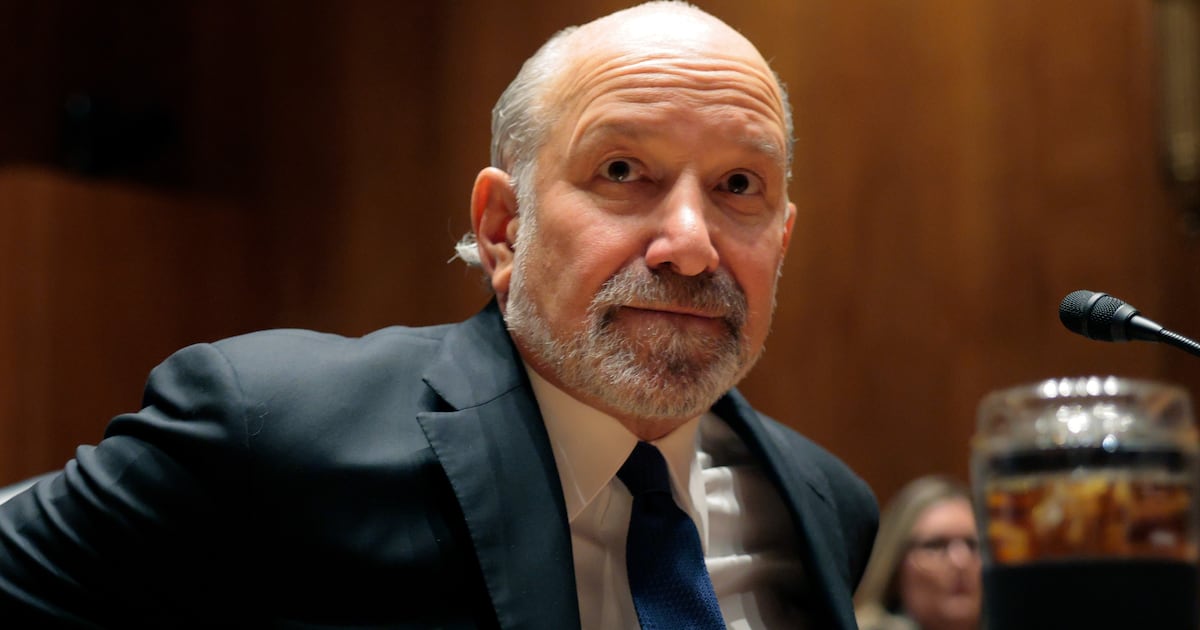Senator Jeff Sessions, Donald Trump’s pick for attorney general, has come under fire for accepting an award from right-wing extremist David Horowitz.
What Sessions said when he accepted it may prove to be even more explosive.
“Ultimately, freedom of speech is about ascertaining the truth,” Sessions, an Alabama Republican, told Horowitz’s audience on Nov. 14, 2014. “And if you don’t believe there’s a truth, you don’t believe in truth, if you’re an utter secularist, then how do we operate this government? How can we form a democracy of the kind I think you and I believe in… I do believe that we are a nation that, without God, there is no truth, and it’s all about power, ideology, advancement, agenda, not doing the public service.”
The comments have not been previously reported, nor have any of Sessions’s colleagues asked about them at his confirmation hearings.
While plenty of elected officials may hold similar beliefs, Sessions is a nominee for attorney general, the chief law enforcement officer in the country. His comments raise questions as to which set of “truths,” religious or secular, would motivate his Justice Department’s decisions on which laws to prosecute, which liberties to protect, and which interpretations of legal and constitutional texts to adopt.
“It goes against the values our country was founded on to intertwine religion and government in the way that Sessions described,” Michael Keegan, president of the liberal advocacy group People for the American Way, told The Daily Beast. “The equality of every American, regardless of his or her religious beliefs or nonbelief, is one of the core principles of our democracy. If Jeff Sessions can’t understand that, he’s unfit to serve as attorney general.”
Indeed, to describe freedom of speech as being about “ascertaining the truth” flies in the face of 200 years of Supreme Court precedent, which protects artistic expression, commercial speech, and free expression of all types, regardless of whether they are intended to ascertain the truth.
Other comments made to Horowitz’s “Freedom Center” raise further questions regarding Sessions’s beliefs.
“I’ve seen some great people receive this [award], David, and it’s a special treat and pleasure for me because you know how much I admire you as we battle for, I think, for right and justice and law and American people’s legitimate interests and expectations from their government,” Sessions said.
At the time, the most recent recipients of the “Daring the Odds” award included the extreme anti-Muslim blogger Pamela Geller and former Senator Russell Pearce, who was the co-author of Arizona’s draconian anti-immigrant law. (This year, it was awarded to alt-right icon Milo Yiannapoulos.)
And at an earlier Freedom Center event, held on Feb. 13, 2013, Sessions praised Horowitz for having made a “profound contributions to the conservative movement,” and praised his book A Point in Time as being “a good book, a wise book, well in the tradition of the Western heritage of faith and reason.” Sessions stated that after reading Horowitz’s book Radicals, “I had an epiphany.” Sessions telephoned Horowitz who “gave me some ideas… it’ll make a difference in how we approach things.”
Most recently, of course, Sessions described Horowitz as “brilliant” at his confirmation hearing.
The close relationship between the two, which Sessions effusively described four years ago but omitted from the questionnaire he provided to the Senate, raises questions about how Sessions regards Horowitz’s “profound contributions,” which often tilt to the extreme far right.
For example, Horowitz has accused Hillary Clinton and Grover Norquist of being secret agents of the Muslim Brotherhood. In 2014, shortly before Sessions received his award, Horowitz called Nancy Pelosi a “Jew-hating bitch” on Twitter. In 2016, he called anti-Trump conservative Bill Kristol a “renegade Jew.” Other choice quotes include “No people have shown themselves as so morally sick as the Palestinians” and that African-American “demands for special treatment” are “only necessary because some blacks can’t seem to locate the ladder of opportunity within reach of others.”
Horowitz has also attracted controversy by drawing an annual salary in 2013 of $540,000 and for his subsidizing the work of Geller, Robert Spencer (cited 162 times by Norwegian mass murderer Anders Breivik), and conspiracy theorists.
Horowitz’s website, FrontPageMag, regularly incites rage in broad hit pieces, such as one a few weeks ago calling President Obama’s Chanukah party an “abomination of a mockery,” calling rabbis in attendance “Rabbis” and calling an Orthodox yeshiva “leftist.” Headlines on today’s front page alone include “Obama says goodbye to a nation he despises”; “You can’t fight anti-Semitism without exposing Islamophobia as a lie”; and one describing the joint intelligence report on Russian hacking as a “one-sided report [that] smells like a political hatchet job.”
Sessions has attended at least five of Horowitz’s Freedom Center conferences, and, so far at least, has doubled down in his support of Horowitz himself.
But it is the 2014 remarks that raise the greatest questions about the prospective attorney general, for they constitute not merely an embrace of Horowitz’s extremism but a theocratic vision of American democracy at odds with that of the Founding Fathers—not to mention a misunderstanding of “secularists” who, from Mark Twain to Stephen Hawking, Thomas Jefferson (a deist), to Elizabeth Cady Stanton, have often been very interested in the pursuit of truth.
If Sessions believes that without God, there is no truth, and that secularists cannot “operate” the government, how will he discharge his duties to enforce the rule of (secular) law, investigate the truth or falsity of crucial allegations, and ensure that all people are treated equally?






